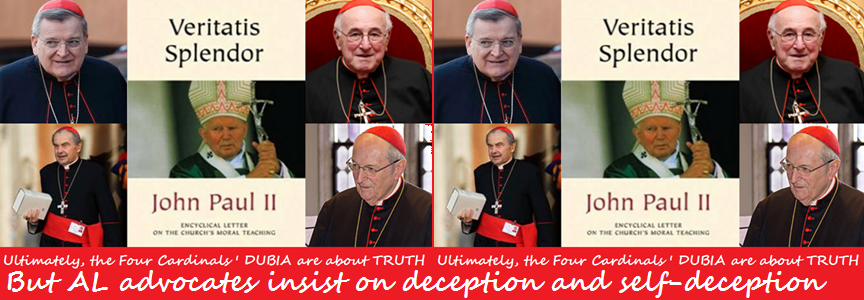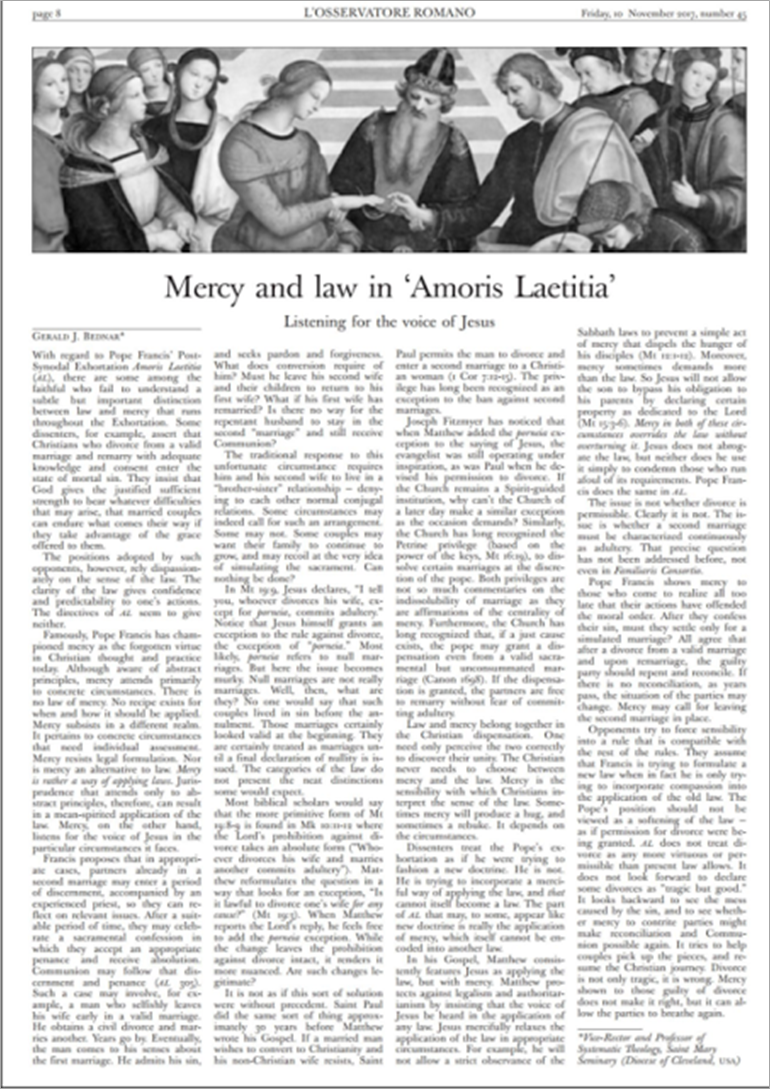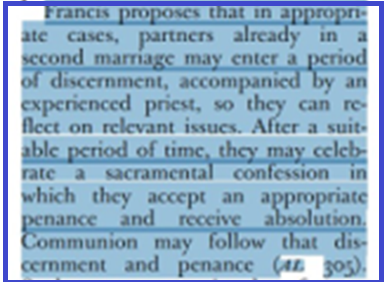 Error & fiction in Amoris Laetitia
Error & fiction in Amoris Laetitia
pushed by the pope's own newspaper
[Why not? It's his newspaper. It would be news
if it didn't push AL as he conceived it]

November 14, 2017

The English weekly edition of
L'Osservatore Romano has published an article attacking dissenters of Amoris laetitia,
saying Pope Francis supports the Kasper proposal (explicitly rejected at the two Synods). By anyone's standards this
would seem quite extraordinary, but it is also printing verifiable error!

For example, this paragraph is completely ridiculous as well as being verifiably false. What an extraordinary thing for L'Osservatore to print?! This question has been addressed before, by Jesus Christ. It was also addressed in Familiaris Consortio
(no. 84) which upheld the Church’s perennial practice of “not admitting to Eucharistic Communion divorced persons who have remarried,” unless they “take upon themselves the duty to live in complete continence.” Pope St. John Paul II actually emphasises the permanence of the discipline by insisting that it is “based on Sacred Scripture” (84).
In 1994, after a number of bishops and theologians had put forward certain pastoral proposals, strikingly similar to those found in Amoris Laetitia, (after all, we can see all these proposals in the National Pastoral Congress which took place here in Liverpool, England in 1980), allowing for exceptions to the discipline in specific cases,
the Congregation for the Doctrine of the Faith under the auspices of John Paul II intervened and reaffirmed the traditional discipline, which it called “the constant and universal practice” of the Church:
“This practice, which is presented as binding, cannot be modified because of different situations” (5).
Pope Benedict XVI explained the truly pastoral approach that is under attack by those who appear to push a false mercy void of truth.
“Some say...that the rigidity of law prevails over an understanding of dramatic human situations.
They claim that the human person of today is no longer able to understand such language, that Jesus would have had an open ear for the needs of people, particularly for those on the margins of society.
They say that the Church, on the other hand, presents herself like a judge who excludes wounded people from the sacraments and from certain public responsibilities...
Assuredly, the word of truth can be painful and uncomfortable. But it is the way to holiness, to peace, and to inner freedom. A pastoral approach which truly wants to help the people concerned must always be grounded in the truth. In the end, only the truth can be pastoral.”
— Cardinal Joseph Ratzinger
(then) Prefect of the Congregation for the Doctrine of the Faith
One would think he was commenting on the situation today!
Meanwhile, I'll let Christopher Ferrara express some of the sentiments I have regarding the inept fence-straddler Cardinal Mueller. I've had enough of head-swiveling to try and follow which side he's on at the moment...
Has Cardinal Müller joined the casuist brigade? – Part I
Follow his bouncing commentary
by Christopher A. Ferrara

November 10, 2017
The word casuistry has two meanings: “(1) a resolving of specific cases of conscience, duty, or conduct through interpretation of ethical principles or religious doctrine, (2) specious argument.”
It is very easy for the first meaning to collapse into the second, especially when one is dealing with an ethical principle that is
a negative precept of the natural law respecting intrinsically evil actions that are always and everywhere wrong, regardless of the situation in which they occur.
Such is the case with the dogged defenders of Chapter 8 of Amoris Laetitia (AL), which opens the door to absolution and Holy Communion for public adulterers in “second marriages” based on “the concrete complexity of one’s limits”
(AL 303), which “limits” — in the amorphous category of “certain cases” — supposedly reduce the objective mortal sin of adultery to one that is merely venial and thus no bar to the sacraments.
This, of course, is simply situation ethics disguised by empty verbiage concerning “concrete situations” in life, as if any situation in life were not concrete. But as John Paul II taught in
Veritatis splendor,
the appeal to “concrete reality” in order to circumvent exceptionless moral precepts is absolutely inadmissible:
“In order to justify these positions, some authors have proposed a kind of double status of moral truth. Beyond the doctrinal and abstract level, one would have to acknowledge the priority of a certain more concrete existential consideration.
The latter, by taking account of circumstances and the situation, could legitimately be the basis of certain exceptions to the general rule [emphasis in original] and thus permit one to do in practice and in good conscience what is qualified as intrinsically evil by the moral law.
A separation, or even an opposition, is thus established in some cases between the teaching of the precept, which is valid in general, and the norm of the individual conscience, which would in fact make the final decision about what is good and what is evil.
On this basis, an attempt is made to legitimize so-called ‘pastoral’ solutions contrary to the teaching of the Magisterium, and to justify a ‘creative’ hermeneutic according to which the moral conscience is in no way obliged, in every case, by a particular negative precept.
No one can fail to realize that these approaches pose a challenge to the very identity of the moral conscience in relation to human freedom and God’s law. Only the clarification made earlier with regard to the relationship, based on truth, between freedom and law makes possible a discernment concerning this ‘creative’ understanding of conscience….
“But the negative moral precepts, those prohibiting certain concrete actions or kinds of behaviour as intrinsically evil, do not allow for any legitimate exception. They do not leave room, in any morally acceptable way, for the ‘creativity’ of any contrary determination whatsoever. Once the moral species of an action prohibited by a universal rule is concretely recognized, the only morally good act is that of obeying the moral law and of refraining from the action which it forbids.”
How sad, then, to see Cardinal Gerhard Müller, following his sacking as the inconvenient head of the Congregation for the Doctrine of the Faith, apparently joining the casuist brigade in defending AL’s “concrete complexity” canard.
In a preface to a book by Rocco Buttiglione, which has been trumpeted by progressives as a repudiation of the four cardinals’ DUBIA concerning AL’s attempt to smuggle situation ethics into Catholic moral theology, Müller makes an argument worthy of the Pharisees: He declares that
the “Spirit’s sins can be more serious than flesh’s sins. Spiritual pride and avarice introduce into religious and moral life a more profound disorder than impurity resulting from human weakness”.
This is moral sophistry. There is no bright line between “sins of the spirit” and “sins of the flesh,” nor any categorical ranking of the first as worse than the second.
First of all, spiritual disorders and sins of the flesh go together, and pride is often involved — precisely as we see with those who insist their “second marriages” are valid unions and that they are entitled to the sacraments while continuing to engage in what Our Lord Himself called adultery without exception.
And the suggestion that the sin of avarice is a “spiritual” sin worse than the “fleshly” sin of committing adultery with a neighbor’s wife is laughable, for adultery involves both avarice and lust. Are we supposed to believe that the commission of adultery with a neighbor’s wife is less serious than coveting a neighbor’s fancy car?
Müller here exhibits the astounding tendency of the current pontificate: excusing or minimizing the gravity of violations of the Sixth Commandment. Yet Our Lady of Fatima warned the seers that “more souls go to hell because of sins of the flesh than for any other reason,” as such sins are more commonly committed and less often repented of before death.
Incredibly, Müller lends his name to the encouragement of such sins in the name of “human weakness,” as if the assistance of God’s grace were not even part of the picture.
Müller’s preface further argues for a purely casuiStical — in the pejorative sense — search for excuses for the continuation of an adulterous relationship. He writes:
“Individual Christians can find themselves without their own fault in the harsh crisis of being abandoned and of not being able to find any other way out than entrusting themselves to a person of good heart, and the result is a marriage-like relationship.
A special spiritual discernment of the confessor’s internal forum is needed to find a path of conversion and reorientation towards Christ that is right for the person, going beyond an easy adaptation to the relativistic spirit of time or a cold application of dogmatic precepts and canonical dispositions, in the light of the truth of the Gospel and with the help of the previous grace”.
Notice the classic Modernist caricature of Church teaching: “a cold application of dogmatic precepts and canonical dispositions,”
as if it were cold and merciless to inform a penitent of Our Lord’s exceptionless teaching on the indissolubility of marriage:
“Every one that putteth away his wife, and marrieth another, committeth adultery: and he that marrieth her that is put away from her husband, commmitteth adultery.” (Luke 16:18)
The Sixth Commandment does not permit exceptions for an abandoned wife who purports to marry another and thus willingly engages in sexual relations outside of marriage with a partner in adultery, relations which are intrinsically evil — always and everywhere wrong — no matter what the claimed justification.
If it were otherwise, then the Commandments would be reduced to mere benchmarks for the heroically virtuous and thereby would cease to be the moral law as such.
The appeal to the hard case is camouflage to smuggle in the general proposition that people who persuade a priest in the confessional that they are “excusable” adulterers, given their particular “concrete circumstances,” can receive absolution and Holy Communion, whereas other adulterers would continue to be denied the sacraments if their excuses were not good enough.
[B
]Müller embraces precisely the “easy adaptation to the relativistic spirit of time” he professes to deplore. But when has a priest-confessor ever played the role of “discerning” the “good” adulterers from the “bad” adulterers in the confessional? Never in the history of the Church. Never, that is, until the appearance of AL.
In an ultimate exercise in Pharisaical casuistry, Müller’s preface suggests that
in the “internal forum” a priest could admit to the sacraments one who is convinced that his “first marriage” in the Church is invalid, even if “this cannot be canonically proven because of the material context or because of the culture of the dominant mentality” — whatever that means.
In essence, Müller argues for the effective equivalent of “self-decreed annulments” without any canonical process, which equates to Catholic divorce — taking place in the confessional, no less!
When the former head of the Vatican’s doctrinal department countenances such casuistical nonsense for the sake of defending a single errant document issued by a clearly wayward Pope, a document that flies in the face of all Tradition and even the teaching of Pope Francis’s two immediate predecessors, there can be no denying that the Church is now in the midst of the most acute stage in what was already the worst crisis in her history.
Here we encounter what Pope Benedict admitted is the true gravamen of the Third Secret of Fatima: not the execution of a Pope on a hill outside a ruined city, which is only the aftermath, but rather an attack on the Church from within by sin running rampant in her human element, leading to the apocalyptic scene in the vision of the “Bishop dressed in White.”
This is what Sister Lucia meant by “the final battle between the Lord and the reign of Satan [over] marriage and the family.”
Has Cardinal Müller joined the casuist brigade? – Part II
November 13,2017
In the firestorm that followed publication of the Müller preface, the Cardinal has since walked back his statements — but not convincingly, in my opinion. In a telephone interview, translated into English by Life Site News, the Cardinal affirms that “The Dubia are authoritative and clearly legitimate….”
Yet, early this year, the Cardinal slammed the “DUBIA cardinals,” declaring that
“what astonished me is that it was made public, trying to force the pope to say yes or no. I do not like this. It harms the church to talk about these things in public.” Not exactly a direct contradiction, but certainly a different tune from what the Cardinal is singing now.
The Cardinal went on to state that in his preface to Buttiglione’s book
he was not proposing any “exception” to the ban on Holy Communion for validly married Catholics who purport to divorce their spouses and enter “second marriages,” but rather was merely referring to situations that arise in Latin America and elsewhere, where people marry “informally” without benefit of a priest, or “under regimes that persecute the Church, where it isn’t possible to be married canonically” and only a natural union based on consent is possible.
But even natural, non-sacramental marriages are indissoluble outside of the Pauline and the Petrine privileges. Yet in his attempted walk-back, Müller argues that with natural marriages based on consent, when the parties separate and purport to remarry “everything depends on the internal forum, on their honesty in acknowledging if there was consent…”
That simply isn’t so.
The canonical forum, not the so-called “internal forum,” would still be needed to adjudicate the nullity of any purported natural marriage before the Church could approve of a canonical union with a new partner.
Moreover, Müller’s preface speaks of much broader circumstances than merely Third-World anomalies. He writes:
“Individual Christians can find themselves without their own fault in the harsh crisis of being abandoned and of not being able to find any other way out than entrusting themselves to a person of good heart, and the result is a marriage-like relationship.” There is no limitation to natural marriages of possibly dubious validity.
And, of course,
Buttiglione’s book, to which Müller lent his name, argues precisely for “exceptions” to the Church’s Eucharistic discipline even in the case of marriages according to canonical form.
In fact, while trying to walk back his preface,
Müller only reaffirms his support for Buttiglione’s and AL’s opening to Holy Communion for public adulterers when he declares that
“These are cases of unconscious Christians, who are baptized but unbelieving, who may have gotten married in the Church to please their grandmother, but without a real awareness. Here it becomes a problem when, after many years, they return to the faith and then question the marriage. There are many such cases. Benedict XVI also looked at the issue. So what’s to be done?”
What does the Cardinal mean by “What is to be done?”
He knows very well what is to be done: the same thing that has always been done before Pope Francis. That is, the one purporting to remarry in such a case must seek an annulment, and if one is not granted on grounds of lack of consent then he or she must accept that he/she is still validly married to the first and only spouse and cannot marry another.
One cannot simply declare a “self-decreed annulment” through “discernment” in the “internal forum” and then receive the sacraments while engaging in sexual relations with someone to whom one is not married.
Furthermore, even if this sort of self-granted pseudo-annulment were possible for pastoral purposes — and it isn’t — what about the second “union,” which is likewise without canonical form?
Is the Church now supposed to recognize civil unions following divorce as valid marriages, or else permit Church weddings following a self-granted “annulment” in the “internal forum” without any declaration of nullity under canon law?
Müller, signing on to Buttiglione’s sophistry, cracks open the door to chaos even as he purports to deny that he advocates any exceptions to the indissolubility of marriage.
And so, the Cardinal continues to talk out of both sides of his mouth. [The tragedy is that he does not appear to realize it, and keeps going to and fro with his pathetic arguments. He should just shut up for now - no one is hanging on his words, except those he thereby allows to instrumentalize him.]
And yet even this equivocating prelate was too conservative for Pope Francis.
With defenders of the indissolubility of marriage like these, it is no wonder the Church is now involved in a “final battle” over marriage and family.
[Modificato da TERESA BENEDETTA 15/11/2017 23:20]